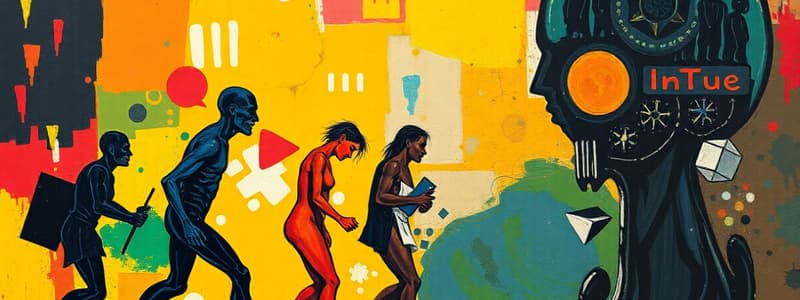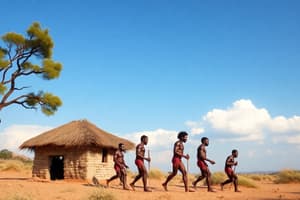Podcast
Questions and Answers
Match the following forms of communication with their descriptions:
Match the following forms of communication with their descriptions:
Ethnocentrism = Judging other cultures by the standards of one's own Cultural Relativism = Understanding a culture on its own terms Politics = The art of government and public affairs Compromise = Finding a middle ground in discussions
Match the following evolutionary stages with their descriptions:
Match the following evolutionary stages with their descriptions:
Hunting and Gathering = The original human subsistence strategy Neolithic Revolution = Shift to agriculture and permanent settlement Industrial Revolution = Transformation through mechanization and factories Post-Industrial Revolution = Shift towards an economy based on services and information
Match the following historical concepts with their significance:
Match the following historical concepts with their significance:
Early Civilizations = Development of complex societies with states Democratization = The process of making a government more representative Human Biocultural Evolution = Interplay of biological and cultural changes Cultural Adaptation = Adjustments made in response to environmental changes
Match the following terms with their related concepts:
Match the following terms with their related concepts:
Match the following stages of human evolution with their key characteristics:
Match the following stages of human evolution with their key characteristics:
Study Notes
Forms of Communication
- Ethnocentrism prioritizes one’s own cultural values over others, while cultural relativism emphasizes understanding cultures in their own contexts.
- Effective communication incorporates awareness of both ethnocentric biases and culturally relative perspectives.
Politics
- Politics encompasses governance, which includes public affairs and the necessity for compromise and consensus.
- Power dynamics play a crucial role in political interactions and decision-making processes.
Human Biocultural and Social Evolution
- Biological evolution tracks the transition from Homo habilis and earlier species to Homo sapiens sapiens, showcasing significant physiological development evident in the fossil record.
- Cultural evolution includes the progression from hunting and gathering societies to advanced agricultural, industrial, and post-industrial societies.
The Neolithic Revolution
- The Neolithic Revolution marked a transition to agriculture, leading to settled communities and the development of complex societies.
- This pivotal shift allowed for population growth and the formation of early civilizations.
Early Civilizations and the Rise of the State
- The emergence of early civilizations laid the groundwork for structured governance and the establishment of states.
- Factors contributing to state formation included agricultural surplus, social stratification, and the need for resource management.
Democratization
- Democratization refers to the transition towards more inclusive forms of governance, involving broader participation in political processes.
- This process often leads to increased rights and representation for various groups within society.
Cultural Adaptation and Evolution
- Culture plays a vital role in human adaptation, influencing social interactions and survival strategies.
- Ongoing cultural and sociopolitical evolution reflects humans' capacity to adapt to changing environments and societal needs.
Studying That Suits You
Use AI to generate personalized quizzes and flashcards to suit your learning preferences.
Description
Explore the interconnected themes of communication, politics, and the evolution of human societies. This quiz emphasizes the importance of cultural perspectives, the role of governance, and the significant transitions in human biocultural evolution from early species to advanced civilizations. Test your understanding of these fundamental concepts.




